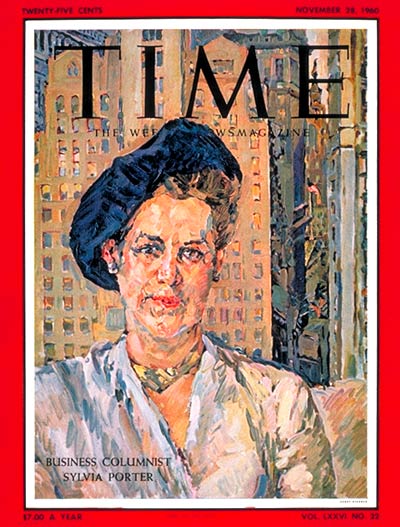It wasn't that long ago in the United States that men were the breadwinners and women needn't bother their pretty little heads about such weighty matters as family finances and investment strategies.
Sylvia Porter, who died 20 years ago this month, helped change all that by making money matters accessible and acceptable to tens of millions of American women. She was both a trailblazer in the overwhelmingly male-dominated world of finance and Wall Street, and a tireless advocate for financial literacy, especially for women.

"Sylvia Porter was the first to say (actually, shout) that women had a responsibility to understand -- and to enjoy -- money" writes biographer Peggy K. Pearlstein.
Such was Porter's influence and connection with the American public that in November 1960, a portrait of the economist, financial journalist and author graced the cover of Time magazine. Wrote Time: "More plain everyday consumers listen to Sylvia Porter than to any other economic writer in the profession."
In 1975, her encyclopedic 1,105-page book, Sylvia Porter's Money Book: How to Earn It, Spend It, Save It, Invest It, Borrow It, and Use It to Better Your Life, was an instant mega-hit, selling more than one million copies.
At her apex, a few years later, Porter's newspaper columns appeared in more than 450 newspapers and reached more than 40 million global readers -- especially women.
In truth, women in our time still lag well behind men when it comes to acting as the primary financial decision makers in their families. Nevertheless, fully 95% of American women today do participate in household financial decisions, according to a 2010 study titled, "Financial Experience & Behaviors Among Women."
Porter -- who Time described as a pert, brown-eyed, dark haired, nail-biting, chain-smoking, go-getter -- helped enfranchise American women to the investment world, teaching them core concepts and strategies so they need not ask for a man's help to take the reins of what Porter termed "pocketbook issues."
At a time when daily business news coverage was stuffy and technical, Porter railed against what she termed the "bafflegab" lingo of finance, preferring to express investment and money concepts in words and imagery that didn't require readers to obtain a specialized education.
Porter always addressed her readers as "you," as in "your money," "your cost of living" and "your decision."
Raised in a middle class family in Brooklyn, Porter's father -- Louis Feldman, a physician -- died of a heart attack in 1925 when she was only 12, leaving it to her mother to become the family's income earner and financial manager. Her mother lost $30,000 on an investment during the 1929 stock market crash, which set Porter on a lifelong exploratory course to understand money and how to safely grow it.
At first, as a 22-year-old financial news freelancer for the New York Evening Post in 1935, Porter was required to use the byline "S.F. Porter" to mask the fact that she was a woman. But Porter's crusading reporting, fighting for the common person and exposing financial graft, earned her a growing and loyal audience. Still "bearded" as "S.F. Porter" in 1938, she was made the newspaper's financial editor and began writing a daily column.
It took until July 1942 for the Post to finally realize that Porter's gender might actually be an asset. It was then that the paper allowed her to write as "Sylvia F. Porter" and began running her photo. Five years later, her articles became nationally syndicated and her influence and readership multiplied many times over.
Porter, who died of emphysema just shy of her 78 birthday, spent more than a half-century advocating for financial literacy and was a firm believer that individuals can -- and should -- take control of their money, savings and investments. "I like to think I've contributed in some way to the increasing willingness of the American public to take on the responsibilities of the economy," she once said in reflecting on her accomplishments.
Among Porter's enduring philosophies is that education is one of the best possible personal investments; that individuals should dismiss theoretical comparisons to "average" investors, since there is no such thing; and that money is more than coins and bills -- it "can be translated into the beauty of living, a support in misfortune, an education, or future security."
As for the notion, especially prevalent in her early days, that it was somehow unseemly for a woman to concern herself with economics and personal finance, Porter would have none of it.
"I've always been independent," she remarked. "I don't see how it conflicts with femininity."
New York Times bestselling author Pamela Yellen is the executive editor and founder of www.BankOnYourselfNation.com, a personal finance and lifestyle website dedicated to self-reliant, independent-minded investors and savers.